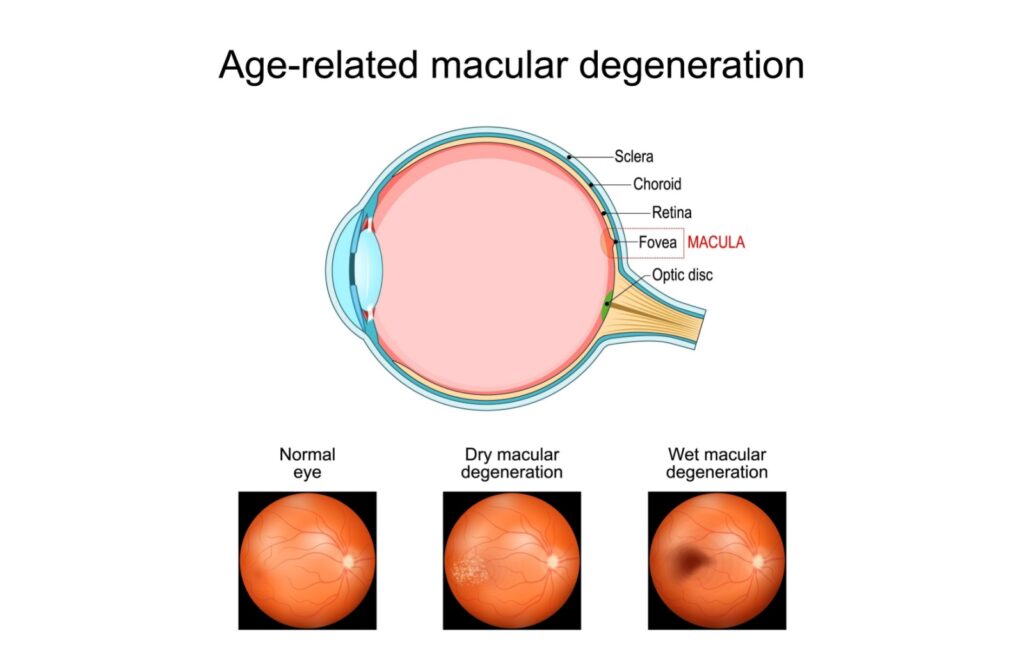If you’ve watched a parent or grandparent struggle with vision loss from macular degeneration, you might be wondering: “Will this happen to me too?” It’s a question that weighs heavily on many people’s minds, especially when they start noticing changes in their own vision.
Yes, macular degeneration can be hereditary, with genetics playing a significant role in determining your risk of developing this condition.
Having a family history doesn’t guarantee that you’ll also develop macular degeneration, but it does make regular eye exams more important. Early detection through comprehensive vision assessments can make all the difference in preserving your sight.
What Is Macular Degeneration?
Macular degeneration affects the macula, a small but important part of your retina that’s responsible for sharp, central vision. Think of it as the “detail center” of your eye—it’s what allows you to read, recognize faces, and see fine details clearly.
When the macula begins to deteriorate, this creates problems with your central vision while typically leaving your peripheral vision intact. You might notice difficulty reading small print, trouble recognizing faces, or straight lines appearing wavy.
This condition is one of the leading causes of vision loss in people over 50, but it rarely leads to complete blindness. Many people continue living fulfilling lives with macular degeneration, especially when it’s caught early and managed properly.
Types of Macular Degeneration
Not all cases of macular degeneration develop the same way. There are two main types, each with different characteristics.
Dry Macular Degeneration
Dry macular degeneration is the most common form, accounting for about 85-90% of cases. It develops gradually as the macula thins with age and small deposits called drusen accumulate under the retina.
The progression of dry macular degeneration is typically slow, giving you and your eye care team time to monitor and manage the condition.
Wet Macular Degeneration
Wet macular degeneration is less common but more serious. It occurs when abnormal blood vessels grow beneath the retina and leak fluid or blood, causing rapid vision loss.
While it represents only 10-15% of cases, wet macular degeneration is responsible for more severe vision loss. The good news is that several treatments can help slow its progression when caught early.
The Genetic Connection
Your family history plays a substantial role in determining your risk of macular degeneration. If you have a parent or sibling with the condition, your chances of developing it are significantly higher than someone without a family history.
Researchers have identified several genes associated with macular degeneration, with some genetic variations increasing risk significantly. However, having these genes doesn’t mean you’ll definitely develop the condition—it simply means you’re more susceptible.
Environmental Factors That Matter
While genetics load the gun, environmental factors often pull the trigger. Smoking is one of the strongest modifiable risk factors, potentially doubling your risk of macular degeneration. Long-term UV exposure, poor nutrition, and cardiovascular disease also contribute to development.
Understanding these factors is empowering because you can take steps to reduce your risk, even with a genetic predisposition.
Recognizing Early Warning Signs
Macular degeneration often develops gradually, and early AMD may cause no symptoms at all. That is why advanced testing is so important.
At our Westhills location, we offer dark adaptation testing as part of an AMD Assessment. This test measures how quickly your eyes adjust from bright to dim light, often revealing changes before visible signs appear. The assessment also includes a measure of carotenoid antioxidant levels in your skin, which correlate with macular health.
When symptoms do appear, you may notice wavy lines, faded colors, or the need for brighter light when reading. Some people develop blind spots in their central vision or find it harder to recognize faces. If you notice these changes, schedule an eye exam right away, especially if you have a family history.
Treatment Options & Hope for the Future
While there’s no cure for macular degeneration, several treatments can help slow its progression and preserve your vision.
Macumira
At Cowichan Eyecare, we’re proud to offer Macumira treatment, an effective approach to managing age-related dry macular degeneration. This treatment uses micro-current stimulation to help improve retinal function and potentially slow progression of the disease.
Macumira represents hope for people who previously had limited treatment options. The treatment is non-invasive and can be an important part of a comprehensive management plan.
Additional Treatment Approaches
For wet macular degeneration, anti-VEGF injections can help reduce abnormal blood vessel growth and fluid leakage. Nutritional support also plays a role in managing risk and progression. AREDS2 supplements are typically recommended for patients with intermediate or advanced dry AMD, as well as wet AMD. For prevention and early AMD, carotenoid supplementation may be advised to support macular health.
Another emerging option is red light therapy, which uses specific wavelengths of light to stimulate energy production in retinal cells. Research suggests it may help improve mitochondrial function and support healthier vision in the early stages of AMD. While still a developing treatment, it shows promise as part of a comprehensive management plan.
Taking Control of Your Eye Health

Having a family history doesn’t mean you’re powerless. Quit smoking, maintain a healthy diet rich in leafy greens and fish, protect your eyes from UV exposure, and manage conditions like diabetes and high blood pressure.
Most importantly, prioritize regular eye exams. If you have a family history, consider starting comprehensive exams earlier and maintaining consistent follow-up care.
Your Vision, Your Future
Understanding your genetic risk for macular degeneration is the first step in taking control of your eye health. While you can’t change your family history, you can influence how that risk plays out through lifestyle choices and proactive care.
At Cowichan Eyecare, we understand the concerns that come with a family history of vision problems. Our team is here to help you navigate your risk, explore prevention strategies, and access innovative treatments like Macumira when needed.Don’t let uncertainty about your vision keep you up at night. Schedule a comprehensive eye exam today and take the first step toward protecting your sight for years to come.














